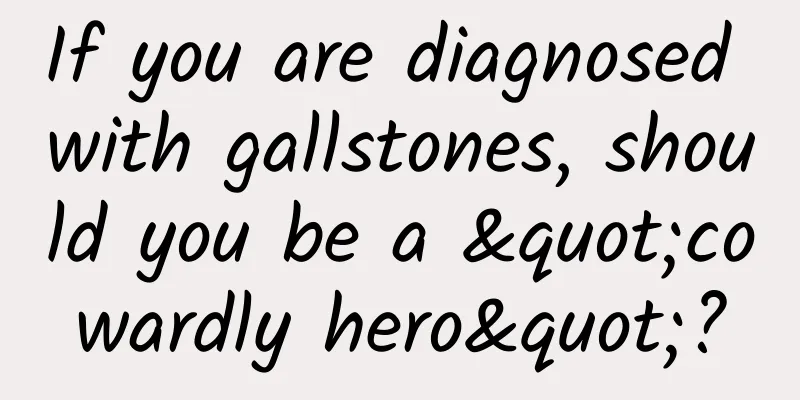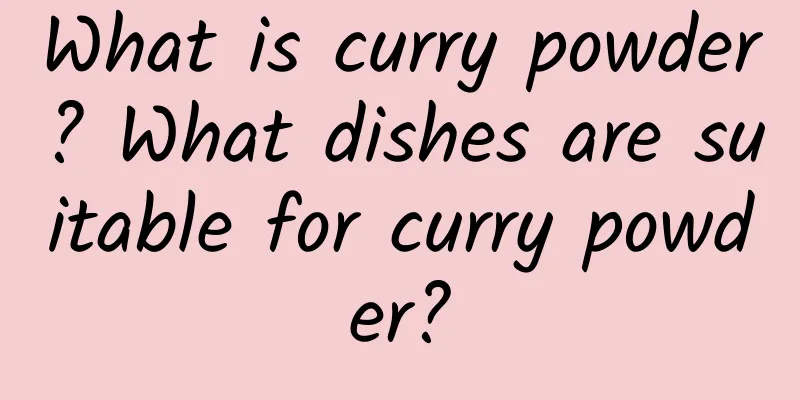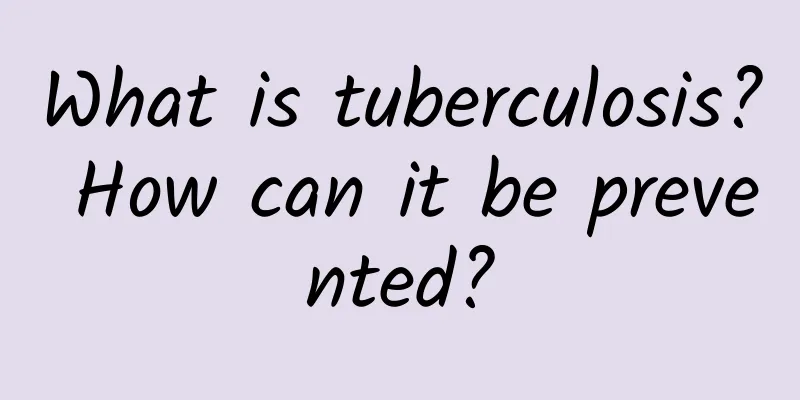If you are diagnosed with gallstones, should you be a "cowardly hero"?

|
Author: Zhang Minghui The Second Affiliated Hospital of Anhui Medical University Wan Lumin The Second Affiliated Hospital of Anhui Medical University Yu Manrong The Second Affiliated Hospital of Anhui Medical University Reviewer: Zhang Bin, Associate Chief Physician, Associate Professor, Second Affiliated Hospital of Anhui Medical University Gallstones, as the name implies, are small stones growing inside the gallbladder. Specifically, gallstones are a type of cholelithiasis. With the improvement of people's living standards and changes in eating habits, the incidence of gallstones has increased year by year. In my country, the incidence of gallstones in adults is between 6.3% and 12.1%, and most of them are between 40 and 50 years old, mostly women. However, in recent years, the trend of gallstones becoming younger has been obvious. Most patients with gallstones may be asymptomatic, and some patients only feel dull pain or discomfort in the right upper abdomen when eating greasy food or when they are nervous or tired, which is often misdiagnosed as stomach disease. Figure 1 Copyright image, no permission to reprint Why do you get gallstones? The causes of gallstones are complex and are related to a variety of factors. Any factor that affects the ratio of cholesterol, bile acid and phospholipid concentrations or causes bile stasis can lead to stone formation. Specifically, the common causes are as follows. (1) Skipping breakfast or leaving too long an interval between meals: If you fast for too long, the bile will concentrate and thicken, which can easily lead to gallstones. Eating on time can stimulate gallbladder emptying, thereby reducing the risk of gallstones. (2) Dieting to lose weight: Excessive dieting or eating only vegetarian food without meat intake can easily cause the gallbladder contraction function to weaken and bile emptying to decrease, leading to cholesterol deposition and the formation of stones. (3) Preferring meat and sweets: Long-term high-fat, high-cholesterol diet and excessive intake of sugar will accelerate cholesterol accumulation. When the cholesterol concentration is too saturated, stones will form. In addition, a love of sweets may also lead to an imbalance in the concentration ratio of cholesterol, bile acid and phospholipids in bile. (4) Obesity: Obesity is one of the important risk factors for gallstones. Does asymptomatic gallstones require management? We often say that gallstones are "little bombs" in the body, which is absolutely true. The gallbladder is an organ that stores bile. When we eat, it stimulates the gallbladder to contract and discharge bile. If there are stones in the gallbladder, they will flow with the bile. When the stones flow into the cystic duct, they will induce dull pain in the right upper abdomen. If you still don't pay attention, the gallstones will continue to increase and become larger. If the stones are too large and get stuck in the cystic duct, they will cause severe spasmodic pain in the upper abdomen, and nausea and dry heaving will often occur. When a stone falls from the gallbladder into the common bile duct, it can cause bile duct obstruction, impair liver function, and even irreversible liver damage. What's more, it blocks the pancreatic duct, induces acute pancreatitis, endangers life, and leads to death. As the old saying goes, if you don't treat a minor illness, it will be difficult to treat a major illness. Don't let a minor illness become a major illness. Figure 2 Copyright image, no permission to reprint If gallstones are detected, does one need immediate surgery, should they be preserved or removed? The gallbladder is the human body's digestive organ. It has the function of storing, concentrating and excreting bile to promote digestion, so whether to remove the gallbladder requires weighing the pros and cons. For those with asymptomatic gallstones that do not cause complications, no surgery is required, and dietary adjustments and drug treatment can be performed. If gallstones induce cholecystitis or other complications, surgical treatment is recommended. Otherwise, the stones continue to irritate the gallbladder, and inflammation recurs, increasing the risk of gallbladder cancer. It is worth noting that gallstones are different from urinary stones. Litholysis and lithotripsy are not recommended because the opening of the bile duct leading to the duodenum is very small. Once the stones are stuck here, they will induce more serious cholangitis or even pancreatitis. Figure 3 Copyright image, no permission to reprint How to choose gallbladder surgery? At present, the main surgical methods for gallbladder are open cholecystectomy, laparoscopic cholecystectomy, and gallbladder-preserving stone removal. Laparoscopic cholecystectomy is the preferred surgical method because of its small trauma, fast recovery, and wide adaptability. Conventional laparoscopic cholecystectomy is to open 3 to 4 small holes of 5 to 10 mm in the patient's abdomen to complete the operation. With the advancement of surgical technology and people's pursuit of beauty, single-port laparoscopic cholecystectomy has gradually entered the clinic. This procedure only requires an incision of about 2 cm in the navel for surgery, and the natural cover of the navel can achieve "scarless" surgery. Open cholecystectomy is gradually eliminated due to its large trauma and slow recovery, and is only selected when laparoscopic surgery cannot be completed. Gallbladder-preserving stone removal surgery is only performed in a few special cases because of its uncertain long-term efficacy and high risk of stone recurrence in the near future. It is not a routine surgical method. Figure 4 Copyright image, no permission to reprint Three steps for postoperative diet management for the “cowardly” hero! Gallbladder removal is not a one-time solution. Common adverse reactions after gallbladder removal include loss of appetite, aversion to oil, discomfort caused by fullness, diarrhea, bile reflux, etc. A reasonable diet can help the body quickly adapt to life without gallbladder. Dietary control after gallbladder removal can be divided into three stages: the first stage is from the completion of the operation to discharge, with a carbohydrate-based diet and avoidance of greasy foods; the second stage is from discharge to 2 to 3 months after the operation, with small and frequent meals, chewing slowly, and a low-fat and light diet, avoiding spicy, stimulating, high-oil, high-fat, and high-sweet foods; the third stage is 3 months after the operation, when the bile duct gradually expands and replaces part of the function of the gallbladder, and the patient can basically resume a normal diet. Figure 5 Copyright image, no permission to reprint |
>>: Uncovering the secrets of narcolepsy: Sleeping Beauty doesn't just appear in fairy tales
Recommend
What is the cause of bloody vaginal discharge and lower back pain?
When it comes to low back pain, many people have ...
How long does it take for the belly to become flat after a caesarean section?
Giving birth is something that every woman has to...
Leucorrhea is like tofu residue and has no smell
Discharge is a liquid secreted from the vagina of...
Can I drink oolong tea during menstruation?
During menstruation, ladies need to pay attention...
What are the food therapies for vaginitis?
Vaginitis is a common disease among women. After ...
What is a cystic dark area?
Some mothers don't understand why miscarriage...
How to avoid heavy bleeding during abortion
In today's society, the cases of unmarried pr...
Do birth control pills cause infertility?
In fact, I don’t need to introduce too much. I be...
How to improve sagging breasts
Having perfect body proportions will always make ...
How to eat the healthiest "Oriental Diet"? Interpretation of the Dietary Guidelines Part 2
Many people may not have noticed that one of the ...
What are the benefits of abortion?
Abortion is an experience that many women have en...
How to treat moderate cervical erosion
Cervical erosion is actually a gynecological dise...
Can anemic women have babies?
Many female friends just want a healthy baby afte...
Can I soak my feet after a miscarriage?
Of course, when you feel overly tired or under gr...
How to read the results of leucorrhea epithelial cell examination
The issue of leucorrhea epithelial cells must be ...









